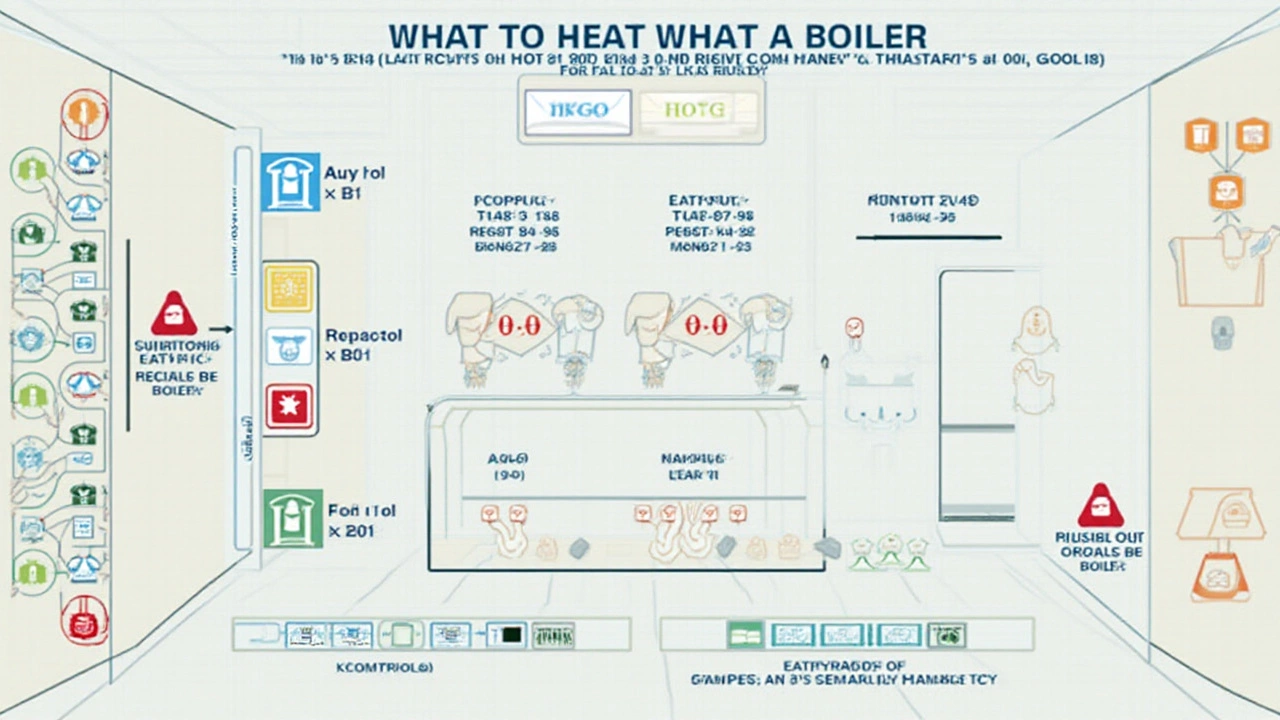Boilers, those steadfast engines of warmth nestled in our basements, work tirelessly to keep our homes cozy through cold spells. Yet, like any hardworking appliance, they can hit snags that demand attention. Faced with the dilemma of repairing or replacing, it can be tough to know the best path forward.
Not only does an efficient boiler contribute to a comfortable living environment, but it also plays a vital role in managing energy consumption and bills. If your boiler shows signs of distress, understanding when a fix will suffice or when to explore replacement options can save time and money.
In this article, we'll delve into the nitty-gritty of boiler maintenance and repair, looking at tell-tale signs that your heating system needs care, and offer guidance to help make informed decisions about maintaining a warm sanctuary during chilly months.
- Understanding Boiler Basics
- Signs Your Boiler Needs Repair
- Evaluating Repair Costs
- Long-term Benefits of Repair
- When to Consider Replacement
Understanding Boiler Basics
Boilers are an essential part of many residential heating systems, with a rich history dating back over a century. They're distinguished by their efficiency in transferring water into steam to heat a building. The working principle involves heating water through fuel combustion, be it gas, oil, or electricity. Upon reaching the needed temperature, this water circulates through pipes to radiate heat effectively across your home. What's fascinating is the diversity of boiler repair types available today, from the traditional to the more modern condensing units. Each type serves a particular purpose and efficiency rating.
The most common boilers you'll likely encounter in households include gas, oil, and electric boilers. Gas boilers, praised for their cost-effectiveness, burn natural gas as fuel. Oil boilers, though requiring more storage, are preferred in areas without access to gas supply. On the rise are electric boilers, noted for their compact size and ease of installation. The decision on which boiler to choose hinges on one's unique home setup and energy considerations. Moreover, assessing the energy efficiency ratings of these systems is vital, as it directly impacts your heating bills and carbon footprint. According to the U.S. Department of Energy, heating, and cooling account for about 56% of the energy use in a typical American home, making it crucial to select a unit that aligns with your environmental priorities.
A key feature in modern boilers is the condensing mechanism, which optimizes energy usage by extracting and utilizing heat that would otherwise evade through the flue. A condensing boiler can achieve an efficiency rating of over 90%, a significant boost compared to non-condensing counterparts. This innovation not only saves on bills but also contributes positively to environmental goals. Maintaining your boiler involves paying heed to signs of wear and setting routine inspections to nip potential issues in the bud. It's beneficial to familiarize yourself with the manufacturer's guidelines and warranty conditions to ensure the system operates smoothly without invalidating agreements.
Maintenance remains a constant factor in prolonging the life of your boiler. This entails regular cleaning, checking seals and connections for leaks, and ensuring there is no buildup in the flue system. An intriguing fact is that, according to a study conducted by the National Renewable Energy Laboratory, routine boiler maintenance can extend the unit's lifespan by up to 30%. This statistic underscores why attention to detail in maintenance can't be overstated. Many homeowners find that scheduling a yearly checkup with a professional technician not only boosts the efficacy of the heating system but also helps pinpoint improvements that align with the latest energy-saving technologies.
Boiler expert James Callaghan once said, "Understanding the basics of your boiler system is pivotal. An informed homeowner can save considerably on repair and heating costs by adopting proactive maintenance routines." This wisdom underscores the importance of familiarizing oneself with how these systems function and recognizing when to seek expert help. Another thing to consider is the upgrade from older systems to more modern installations, often incentivized by government rebates for energy efficiency enhancements.
To sum up, understanding boiler basics is about grasping how these vital systems operate and appreciating the choices available in the market today. Much like any significant home investment, the more knowledge you equip yourself with, the better equipped you are to make decisions that benefit all facets of home living, from comfort to financial savings. Whether you're looking into heating maintenance or upgrading an existing system, this knowledge empowers decision-making that can sustainably warm your home for years to come.
Signs Your Boiler Needs Repair
Our trusty boilers, the cornerstone of home heating systems, occasionally send distress signals when they're not operating optimally. Recognizing these signs early can spare homeowners from untimely breakdowns and ensure that they retain the warmth they need during winter's chill. One of the first indicators that your boiler might require attention is unusual noises. An array of sounds, from clanking and banging to whooshing and whistling, can suggest different issues. These noises often arise from limescale build-up, known as ‘kettling’, which restricts the water flow and causes the water to overheat and steam, much like a teapot.
Another sign is the persistent failure of your boiler to maintain the desired temperature. If your home feels consistently colder than the thermometer setting, it might be more than just a drafty room to blame. Inefficiencies in heating often point to a failing thermostat or a malfunctioning pump. Such issues don't just affect comfort; they can also lead to escalated energy bills, as your system works harder to reach and maintain heat.
Regular maintenance helps prevent some common problems, yet over time, pressure issues might develop. Boilers operate at a certain pressure level, ensuring water moves through the system efficiently. When the pressure drops repeatedly or doesn't hold steady, there might be a leak somewhere in the system or an issue with the pressure relief valve. This scenario not only affects heating efficacy but could also compromise safety. Like many home appliances, boilers do thrive when regularly serviced, but age makes the need for repairs more prevalent.
Sometimes a visual inspection can reveal trouble. If you notice water pooling around the boiler or rusty patches on the unit, your boiler might be suffering from internal corrosion or loose connections, signaling a need for professional repair. Additionally, fluctuations in pilot light color are worth mentioning. A healthy boiler typically has a blue flame, so if it's yellow or orange, this could suggest improper burning, often linked to carbon monoxide concerns, which require immediate expertise.
According to the Energy Saving Trust, "Boilers account for about 60% of what you spend in a year on energy bills, so an efficient boiler makes a big difference." Keeping an eye on these signs allows homeowners to address issues before they balloon into full breakdowns, or worse, safety hazards.
Lastly, erratic behavior like frequently turning off and on, or taking an unusually long time to start, often indicates electrical faults or component failures. Given that modern heating systems are often integrated with various smart technologies, a glitch in these newer systems requires professional handling to diagnose and repair. Gauging the condition of your boiler, paying attention to warning signs it's exhibiting, and seeking expert advice promptly can help keep your home heating system running smoothly, extending the boiler's life and ensuring no one is left out in the cold.

Evaluating Repair Costs
Deciding whether to invest in boiler repair can feel like a crossroad moment in home maintenance. Understanding the repair costs is key to making this crucial decision. First, let's consider the age and condition of the boiler itself. Boilers have a typical lifespan of about 15 to 20 years. If your unit is within this range, you might lean toward repair rather than replacement, but if it’s reaching its twilight years, replacement may be more prudent.
Many factors influence the cost of repairing a heating system. One significant factor is the type of boiler. Combi boilers, for example, often have different components and potentially higher repair costs than conventional ones due to their intricate design. The nature of the problem also impacts the price. A simple valve or thermostat replacement might cost less than $100, while serious issues, such as a heat exchanger replacement, can run into the thousands. It's advisable to get multiple quotes from reputable repair services to ensure you're getting a fair deal.
Another factor is the efficiency of your boiler. An older, inefficient boiler that frequently requires repairs might be a candidate for replacement. Yet, a single, minor repair on a relatively new boiler might be a better economic choice. A cost-effective boiler solution often involves weighing the frequency and severity of the repairs against the benefits of a new, energy-efficient model. Regular maintenance can save on repair costs over time, but this involves a commitment to scheduled check-ups.
If homeowners perform regular maintenance on their boilers, they could reduce their repair costs significantly," says John Morrison, an energy-efficiency consultant. "It's not just about what you repair, but when and how often you’re proactive in maintaining your system."
In considering costs, one must also account for the potential savings from improved energy efficiency that repairs might bring. Older systems tend to lose efficiency over time, which increases monthly utility bills. Even a small improvement in efficiency through repair can lead to significant savings, especially during peak usage periods.
It's wise to consider future repair costs when debating whether to repair or replace. If a boiler is consistently faltering or requires frequent, costly fixes, it may be a wiser investment to put money toward a new system. Look at past repair bills as a trend. This can offer insight into projected future expenses. Discussing these trends with a heating repair specialist can provide an informed perspective on whether investing in repair is filling an economic black hole.
Repair or Replace: Weighing the Options
Now, how do you accurately evaluate your current repair scenario? Begin by creating a list of current repair needs versus anticipated repairs. Consider the immediate costs and balance them against the potential energy savings and rebate incentives available for newer models. Depending on where you live, energy companies often offer rebates for upgrading to energy-efficient boilers, which can soften the financial impact.
In summary, evaluating repair costs involves analyzing a series of interconnected factors: age, repair history, costs, and potential energy savings. This complex decision-making process requires careful thought, but by considering these elements in a systematic way, homeowners can approach their heating maintenance with clarity and financial savvy. Make sure to use the full picture of your boiler's health and efficiency to guide your investment decision.
Long-term Benefits of Repair
Repairing your boiler often presents itself as a cost-effective solution compared to immediate replacement, especially if the unit is not too old and still functions efficiently. Longevity is one of the most significant benefits; a well-maintained boiler can last between 10 to 15 years, or even longer with regular maintenance routines. When choosing repairs wisely, you can avoid the financial burden and inconvenience of installing a new system prematurely. This extends the appliance's lifespan, ensuring that you're not hastily parting with a substantial sum of money.
Many homeowners overlook that regular repairs and maintenance improve their boiler's energy efficiency over its operational life. Efficiency is directly connected to energy consumption and heating bills, as a neglected boiler may show a drop in performance over time. Repaired and regularly serviced boilers ensure it runs at optimal levels, which could translate to significant savings on your energy bills. An efficient heating system is not just about warmth but keeping your energy costs in check while being environmentally conscious.
Enhancing System Reliability
Beyond cost savings, committing to boiler repairs enhances system reliability. Who hasn't faced that dreaded moment when your heating fails during the coldest months of the year? Proper repairs fortify your boiler's robustness, reducing the chances of an untimely breakdown. Routine check-ups and timely repairs secure peace of mind, knowing your home’s heating system is in tip-top shape for the demands of harsh weather conditions. This reliability cannot be underrated because it directly affects your home's comfort level and your family's safety.
A strong argument often made by experts highlights the importance of choosing quality repairs. According to a leading consultant at the Heating and Hot Water Industry Council:
"Investing in regular maintenance can significantly reduce breakdowns and extend the boiler's life, maximizing its value over time."This underscores the need for periodic checks to safeguard the longevity and efficiency of your heating system. The attention to these details today plays a critical role in the lasting welfare of your boiler and, subsequently, your home environment.
From an eco-friendly standpoint, repairing a boiler can also contribute to a smaller carbon footprint. Older models that are repaired and well-maintained can sometimes operate more cleanly than hurriedly purchased new units, which might not be optimized for efficiency in your current home setup. Knowing that your heating system is operating as cleanly as possible, you are also acting responsibly towards environmental conservation.
| Factor | Impact on Boiler |
|---|---|
| Regular Maintenance | Improves Efficiency and Lifespan |
| Timely Repairs | Increases Reliability and Reduces Breakdowns |
| Energy Efficiency | Lowers Heating Bills |
| Environmental Impact | Reduces Carbon Footprint |

When to Consider Replacement
Deciding when to replace a boiler is a choice that many homeowners face, particularly when their heating systems start exhibiting frequent issues. One clear indicator that replacement might be a sound decision is the age of the boiler. Most boilers have a life expectancy of around 10 to 15 years. If your boiler is approaching or surpassing this age, it might be time to consider a new model. Over time, parts can wear down, making it harder for even the most skilled technicians to bring it back to optimum performance.
Another significant factor to consider is the frequency and cost of repairs. If you find yourself calling for technician visits more than once a year, or each repair bill is eating deep into your budget, these are strong indicators that a replacement may be more cost-efficient. Repeated repairs not only strain the wallet but also signify deeper issues that could eventually lead to breakdowns when you least expect them. In fact, many experts suggest that if the cost of repairing a boiler exceeds 50% of the price of a new one, it’s often better to invest in a replacement.
According to the U.S. Department of Energy, upgrading from a 70% efficiency boiler to a 90% efficiency boiler can save 15% in heating bills annually.With energy efficiency standards advancing, newer boilers often operate at a higher level of efficiency, leading to reduced utility bills. This means while the initial investment might be substantial, improved efficiency translates to savings over time. An upgrade to a more efficient model may use less fuel to provide the same amount of heat, making it an environmentally sound decision that can contribute to reduced carbon footprints.
One must also factor in advancements in heating maintenance technology. Modern boilers come equipped with smart features, such as programmable thermostats and COVID-19 responsive air filtration systems. These enhancements not only offer convenience but can dramatically improve the comfort and health standards of a home. For tech enthusiasts or those aiming to future-proof their homes, these factors can tip the balance towards replacement. Finally, if the household's heating needs have changed, for example, after a home expansion or significant remodel, a boiler replacement may be necessary to accommodate the increased load.
Considering Environmental Impact
Addressing the ecological footprint is also a compelling reason for replacement. Older boilers typically produce more carbon dioxide, contributing to higher household emissions. The push towards sustainability encourages homeowners to consider eco-friendly replacements that are kinder to the planet. Several government incentives and rebates are available for those upgrading to energy-efficient models, making it financially easier to transition to greener solutions.
Moreover, incorporating alternative energy sources into your home’s heating doesn’t just lessen environmental impact; it can also lead to energy independence. Think of hybrid systems that utilize both gas and renewable sources like solar panels. Although the transition requires initial investments, it offers long-term benefits by reducing reliance on nonrenewable energy sources and offering protection against fluctuating energy prices.
| Boiler Age (Years) | Repair vs Replacement | Notes |
|---|---|---|
| 0-5 | Repair | Generally economical and the system is still new |
| 5-10 | Repair, Consider Replacement | Weigh repair costs; consider efficiency improvements |
| 10+ | Consider Replacement | Efficiency decreases, repair costs may increase |
